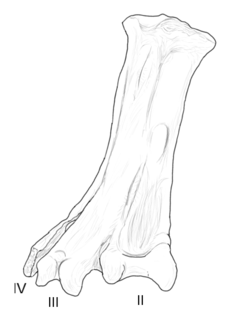 W
WBohaiornis is a genus of enantiornithean birds. Fossils have been found from the Lower Cretaceous Jiufotang Formation of western Liaoning, China. The only known species, Bohaiornis guoi, was named by Dongyu Hu, Li Li, Lianhaim Hou and Xing Xu in 2011 on the basis of a fully articulated and well-preserved skeleton of a sub-adult. This specimen, LPM B00167, preserved two long, ribbon-like feathers attached to the tail rather than a fan of shorter pennaceous feathers. It was similar to the slightly older Eoenantiornis, but much larger in size. Bohaiornis is the type species of Bohaiornithidae, a family of large predatory enantiornitheans from the Early Cretaceous.
 W
WCathayornis is a genus of enantiornithean birds from the Jiufotang Formation of Liaoning, People's Republic of China. It is known definitively from only one species, Cathayornis yandica, one of the first Enantiornithes found in China. Several additional species were once incorrectly classified as Cathayornis, and have since been reclassified or regarded as nomina dubia.
 W
WCratoavis is a genus of enantiornithine birds. The type and only currently described species is C. cearensis, from the Early Cretaceous of Araripe Basin, Ceará, Brazil. The fossil, an articulated skeleton with feathers attached to the wings and surrounding the body, extends considerably the temporal record of the group at South America.
 W
WEnantiornis is a genus of enantiornithine birds. The type and only currently accepted species E. leali is from the Late Cretaceous Lecho Formation at El Brete, Argentina. It was described from specimen PVL-4035, a coracoid, proximal scapula and proximal humerus found close to each other and suspected to represent the left shoulder of one individual bird.
 W
WEoenantiornis is a genus of enantiornithean birds which lived during the early Cretaceous period. It is known from a single fossil specimen found in the Yixian Formation in Liaoning province, China.
 W
WLongchengornis is a genus of enantiornithean birds which lived during the early Cretaceous Period, about 120 mya, and is known from a fossil found in the Jiufotang Formation in Liaoning province, People's Republic of China. It contains the single species L. sanyanensis, though some researchers believe this to be a synonym of the similar species Cathayornis yandica.
 W
WSinornis is a genus of enantiornithean birds from the Lower Cretaceous Jiufotang Formation of the People's Republic of China.
 W
WYungavolucris is a genus of enantiornithean birds. It contains the single species Yungavolucris brevipedalis, which lived in the Late Cretaceous. The fossil bones were found in the Lecho Formation at estancia El Brete, Argentina."Yungavolucris brevipedalis" means "Short-footed Yungas bird". The generic name, Yungavolucris is after the Yungas region + the Latin volucris, which translates to "bird". The specific name brevipedalis is from the Latin brevis, which means "short", + pedalis, from the Latin pes, meaning "foot".